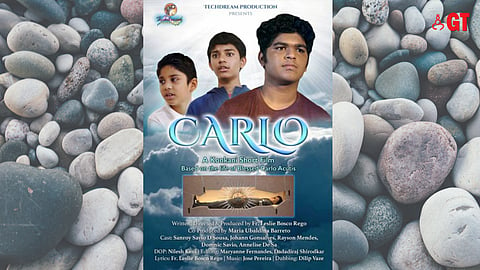

RVA News
An Indian Catholic priest Father Leslie Bosco Rego’s short film was selected for screening at the Global Taj International Film Festival (GTIFF) in Agra, Uttar Pradesh. "It is my extreme honour to inform you that our film Carlo was selected for GTIFF at Agra," said Father Leslie Bosco Rego of the Archdiocese of Goa and Daman. The film was screened on November 12 at the film festival.
"We do appreciate the effort put in by several people behind the screen and would like to thank them immensely. The tireless sacrifice put in by the entire team deserves a mention. May God bless them all," Father Rego said. "I feel proud that our efforts have been rewarded," he added. He is the producer and director of the short film Carlo (a Konkani film), which has subtitles in English.
The movie is about Blessed Carlo Acutis, an English-born Italian Catholic adolescent and amateur computer programmer, best known for documenting Eucharistic miracles around the world and cataloguing them on a website he created before succumbing to leukaemia. He was born in London, United Kingdom, on May 3, 1991, and died on October 12, 2006, in Monza, Italy. He was beatified on October 10, 2020. He is the patron of youth and computer programmers.
"The film's production began two years ago. The progress of it went a bit slowly at the start, but then recently we sped up," Father Rego said. The film was made as a proclamation of faith, especially for today's youth, on how to use modern gadgets without becoming obsessed with them. He said, "Carlo is a perfect role model for children and youth. At the time, he demonstrated how to use the internet and modern gadgets wisely."
Father Rego is also a part of CCR TV, a Catholic TV channel, reaching out to viewers worldwide. The content is in Konkani, English, Marathi and Hindi. He also worked at MANA TV, an ICT-based learning resource, accessible even to students in remote and rural areas.
Over 100 entries were submitted from 10 countries for the GTIFF 2022, but 30 films were selected from India, the United Kingdom, Germany, the United States, Denmark and Egypt. As many as 21 films are selected from India. Most of the entries are in Hindi; the rest are in English, Telugu and Arabic.
The fourth edition of GTIFF 2022 will run for a month. The GTIFF is a unique initiative aimed at connecting filmmakers under one umbrella. It gives filmmakers enough space to understand the world's best cinema.
The international film festival features good and previously unseen stories, and innovations that have broken stereotypes and dark patterns in cinema. An increasing number of filmmakers are experimenting with form and content, making their craft a little more accessible, according to a press statement from the organisers.
The GTIFF is a platform for filmmakers to showcase their cinema in front of a film-loving audience. At the same time, it allows the audience to watch many wonderful and meaningful films around the world. The festival will also highlight good stories through meaningful cinema for the understanding of different cultures, besides having cinema talk sessions, workshops, master classes, entertainment, media interactions, networking, a red carpet walk, appreciation and awards. In the end, several awards will be given away for the international feature film, the Indian feature film, the short film, the documentary and the music video categories.
Father Rego studied at the Stenodac Academy of Professional Photography. He also obtained a master’s in journalism and mass communication from Makhanlal Chaturvedi Rashtriya Patrakarita Vishwavidyalaya, Bhopal, Madhya Pradesh, India. Earlier, he had made other films like Journey of faith, Way of the cross, Treasure shattered and Come to me. All these movies are in Konkani, except for Treasure shattered. Currently, he is the parish priest at St Joseph’s Church, Shiroda, Goa, India, under the Archdiocese of Goa and Daman.
(Radio Veritas Asia (RVA), a media platform of the Catholic Church, aims to share Christ. RVA started in 1969 as a continental Catholic radio station to serve Asian countries in their respective local language, thus earning the tag “the Voice of Asian Christianity”. Responding to the emerging context, RVA embraced media platforms to connect with the global Asian audience via its 21 language websites and various social media platforms.)